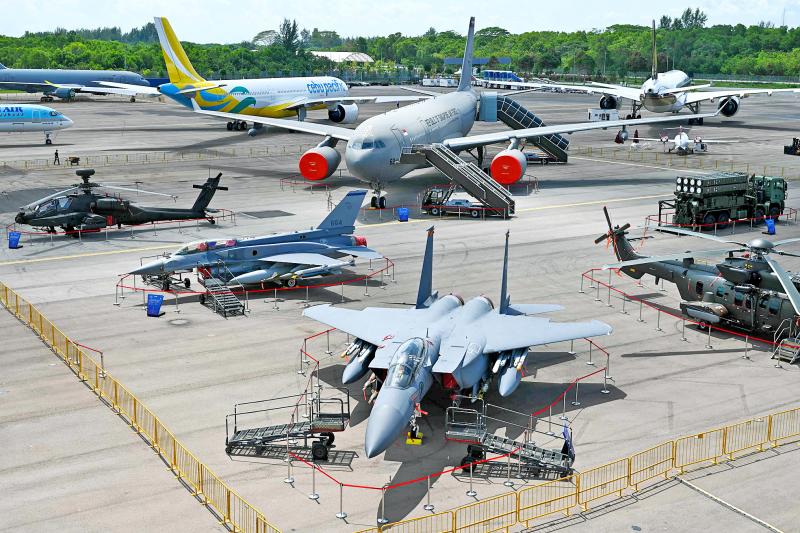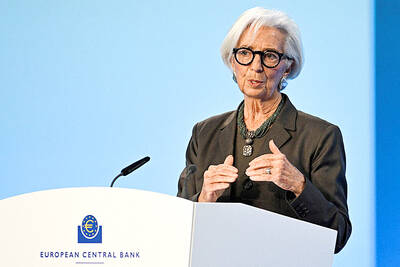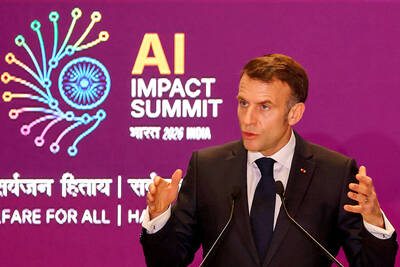The aviation industry’s slow recovery in the Asia-Pacific region is to cast a shadow over the Singapore Airshow this week, despite signs of improvement, as concerns over the Omicron variant of SARS-CoV-2 recede.
The event, held every two years, has bookended the COVID-19 pandemic, with the 2020 edition disrupted by the virus emerging from China and this year’s show coming as the industry attempts to plot a way out of what became its biggest and most costly crisis.
International passenger travel in the region was down 93 percent from pre-pandemic levels last year, leaving airlines heavily reliant on freight for revenue, while the Chinese outbound tourism market remains closed.

Photo: AFP
However, there are signs of a rebound this year, Skyscanner booking data showed, as countries such as Singapore, Thailand, the Philippines, Vietnam and Australia partly reopen to quarantine-free travel for tourists vaccinated against COVID-19.
The head of Finnair Oyj, which specializes in serving Asia from its hub in Helsinki, expressed optimism about a return toward normal business later this year.
Military demand is also picking up, as regional economies recover from pandemic-induced slumps and countries look to bolster their capabilities, as highlighted by Indonesia’s US$8.1 billion order for 42 Rafale fighter jets on Thursday.
Planemakers Airbus SE, Boeing Co and Lockheed Martin Corp are planning to send senior executives to the Singapore Airshow from tomorrow to Friday, using it as an opportunity for rare face-to-face meetings with customers.
However, Asia’s biggest aerospace gathering expects two-thirds fewer exhibitors than 2020, with the challenges of holding the show mirroring the travel difficulties that have pushed some of the region’s airlines to the brink.
Some industry executives have pulled out, concerned about restrictions including daily COVID-19 testing, no intermingling during mealtime, mandatory masks in the tropical heat and hotel isolation if they test positive.
Singapore-based aviation analyst Brendan Sobie said he expected a quiet, locally oriented gathering with many of the overseas executives holding meetings in the city center.
“The concern from many exhibitors is a lack of customers visiting,” Sobie said.
During the pandemic, most Asian airlines have focused on deferring deliveries and handing back planes to lessors rather than placing fresh orders, although Singapore Airlines Ltd in December last year signed a preliminary deal for seven Airbus A350 freighters.
That deal, which also involves reducing orders for passenger planes, could be firmed up this week along with announcements from Airbus and Boeing for new services deals.
Boeing last month launched a freighter version of its 777X wide-body that would compete against Airbus’ A350 freighter.
Public relations efforts at the show are expected to focus on the benefits of new planes in cutting carbon emissions as the industry targets net-zero emissions by 2050 through biofuels and engine technology.
However, environmentalists say the industry is not doing enough.
The show — which typically features displays of military hardware and aerobatics — comes as Southeast Asia remains a key stage for the rivalry between the US and China.
China’s extensive territorial claims in the South China Sea, which it says are based on historic maps, have put it at odds with Taiwan, Brunei, Malaysia, the Philippines and Vietnam, which have competing claims to islands and features.
Collin Koh, a researcher at Singapore’s Institute of Defense and Strategic Studies, said there was interest from military buyers in big-ticket purchases such as new-generation fighter jets, although pandemic-strained budgets remained tight.
“Drones, fixed and rotary-winged transports, maritime patrol and reconnaissance aircraft, for example, would be more sought after given the utility of these assets for a whole range of peacetime purposes,” Koh said.

European Central Bank (ECB) President Christine Lagarde is expected to step down from her role before her eight-year term ends in October next year, the Financial Times reported. Lagarde wants to leave before the French presidential election in April next year, which would allow French President Emmanuel Macron and German Chancellor Friedrich Merz to find her replacement together, the report said, citing an unidentified person familiar with her thoughts on the matter. It is not clear yet when she might exit, the report said. “President Lagarde is totally focused on her mission and has not taken any decision regarding the end of

French President Emmanuel Macron told a global artificial intelligence (AI) summit in India yesterday he was determined to ensure safe oversight of the fast-evolving technology. The EU has led the way for global regulation with its Artificial Intelligence Act, which was adopted in 2024 and is coming into force in phases. “We are determined to continue to shape the rules of the game... with our allies such as India,” Macron said in New Delhi. “Europe is not blindly focused on regulation — Europe is a space for innovation and investment, but it is a safe space.” The AI Impact Summit is the fourth

CONFUSION: Taiwan, Japan and other big exporters are cautiously monitoring the situation, while analysts said more Trump responses ate likely after his loss in court US trading partners in Asia started weighing fresh uncertainties yesterday after President Donald Trump vowed to impose a new tariff on imports, hours after the Supreme Court struck down many of the sweeping levies he used to launch a global trade war. The court’s ruling invalidated a number of tariffs that the Trump administration had imposed on Asian export powerhouses from China and South Korea to Japan and Taiwan, the world’s largest chip maker and a key player in tech supply chains. Within hours, Trump said he would impose a new 10 percent duty on US imports from all countries starting on

STRATEGIC ALLIANCE: The initiative is aimed at protecting semiconductor supply chain resilience to reduce dependence on China-dominated manufacturing hubs India yesterday joined a US-led initiative to strengthen technology cooperation among strategic allies in a move that underscores the nations’ warming ties after a brief strain over New Delhi’s unabated purchase of discounted Russian oil. The decision aligns India closely with Washington’s efforts to build secure supply chains for semiconductors, advanced manufacturing and critical technologies at a time when geopolitical competition with China is intensifying. It also signals a reset in relations following friction over energy trade and tariffs. Nations that have joined the Pax Silica framework include Japan, South Korea, the UK and Israel. “Pax Silica will be a group of nations